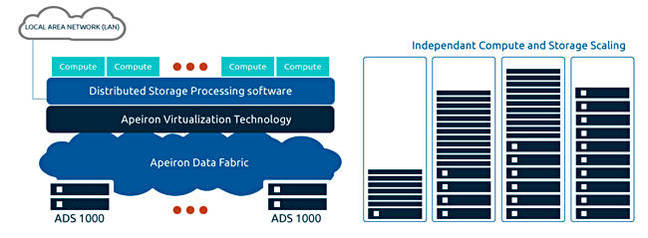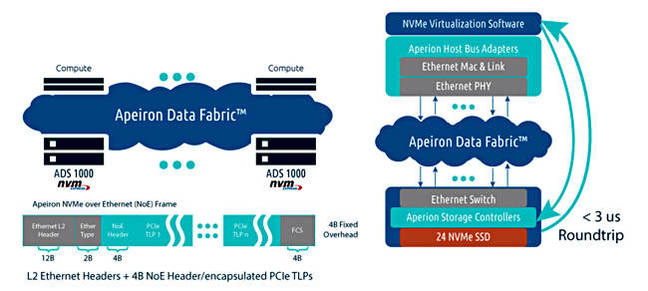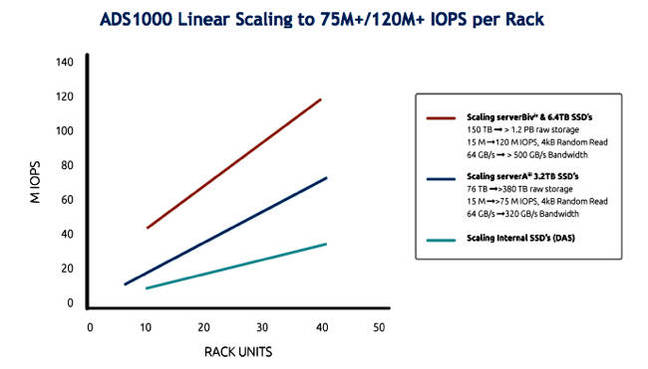This article is more than 1 year old
Apeiron reckons it's the Godzilla of upstart flash arrays
NVMe fabric delivers the low latency access goods, says its marketing spiel
Storage upstart Apeiron's array is a Godzilla of all-flash arrays, delivering up to 3PB of capacity, 120-plus million IOPS and less than three microseconds' latency from a rackful of its ADS1000 array built from separate, scale-out, compute and storage nodes.
Apeiron Data Systems has boldly stepped out from behind the stealth curtain with an NVMe fabric-connected shared DAS array holding NVMe flash drives.
We now have NVMe fabric triplets, with EMC DSSD's D5 and Mangstor's NX Series array.
Israeli startup E8 is also in the same performance area.
The ADS1000 block-access array has separate 1U compute and 2U storage nodes. It delivers 2.5 million IOPS from its compute (server) enclosure and this performance scales linearly. A compute node has two Xeon E5-v3 processors (2x 14 cores, 2x 64GB RAM), two 10G network connections, paired with two or four 40GbitE Data Fabric ports.

Storage Node hardware
The storage node uses up to 24 commercial SSDs. Compute and capacity scale separately with policy-managed software managing the two. Apeiron calls this a shared DAS plaform, a view similar to that of DSSD,
The system has open software cluster management tools which use policy-based storage management for allocating storage resources for each of the compute nodes, so you can vary the compute/storage ratio.
The array offers 38, 76 or 152TB of raw capacity and its latency is less than 100 microseconds; bandwidth is 72GB/sec and IOPS up to a claimed 17.8 million. The performance is dependent on the NVMe drive profile and supplier. There is a 32-port data fabric switch in each enclosure, ports at the rear, which features redundant power supply and cooling modules and has field serviceability. It can scale up to more than 1,0000 NVMe drives, Apeiron says, and these in future could be (Optane) XPoint memory drives.

The arrays are linked by a switched, non-blocking, NVMe-over-Ethernet fabric (NoE) , a hardware-accelerated Layer 2 fabric with under 1.5 microseconds of latency. Each ADS1000 has dual-port PCIe HBAs and the Ethernet fabric runs at 40Gbit/s. There is no need for external switches. Applications on any connected server can access any drive in the NoE fabric.
A storage node has two Input Output Modules (IOM), each if which provides sixteen 40GbitE connections using QSFP+ connectors, making 32 ports in all. Each IOM supports 12 NVMe SSDs through a SFF-8639 connector mid-plane. The hardware supports intra-IOM communication for high-availability management functionality and full-speed access to 12 additional NVMe SSDs. Application compute nodes enable Apeiron Data Fabric connectivity through the Host Bus Adapter, which provides dual 40GbitE connections over a QSFP+ connector. Multiple HBAs can be utilised by the application compute node to maximize performance and bandwidth trade-offs.
A programmable Intel Altera FPGA connects the PCIe and Ethernet switching fabrics and enables the Apeiron’s NoE technology.

Apeiron's NoE (NVMe over Ethernet) fabric scheme/p>
Apeiron’s NVMe management software virtualises the physical NVMe storage volumes. These virtual volumes can be configured to support different application workloads. There is support, through ADS1000 configuration administration tools, for instant compute node failover, automatic replication, and compute node to compute node direct messaging.
Apeiron lists Intel, Mellanox, NEC and Toshiba as its technology partners.
The company, whose name is Greek for infinity or unlimited, was founded in Folsom, near Sacramento, Ca, in January 2013, and is led by CEO and founder William (Lee) Harrison, with the CFO being Rebecca Freeman and Bob Hansen being VP for Solutions [Product] Architecture. Steve Kubes is the Marketing VP.
Hansen has NetApp (Technical Director, Storage) and Xyratex Chief Technologist) experience in his CV.
Harrison was President and CEO of Planar Magnetics which was bought by Tyco Electronic in August, 2010, at which point Harrison became Planar Magnetics' Director. He was a general manager at Intel from 1998 to 2001.

Apeiron ADS1000 performance scaling
A Harrison canned quote said: "Apeiron’s NVMe over Ethernet technology enables the seamless scaling of both servers and NVMe SSD arrays. The fact that Apeiron can address thousands of standard NVMe SSDs is absolutely unique in the industry. Because Apeiron is using native NVMe commands, we enable the customer to choose the proper drive characteristics and price point for their unique application requirements. This ability also means that we fully support the next generation storage from Intel; 3D XPoint technology.”
Three application areas have been mentioned: Big Data analytics; streaming media; and fraud detection.
In April 2013 Apeiron was seeking up to $15m in funding. Velocity Venture Capital has since said it has provided funding for Apeiron.
Download an Apeiron white paper (pdf) here. If you want to see Flash Gozilla in action Apeiron will be demonstrating its NVMe scale-out appliance at Strata + Hadoop World, March 28-31, in Booth P#3. ®
